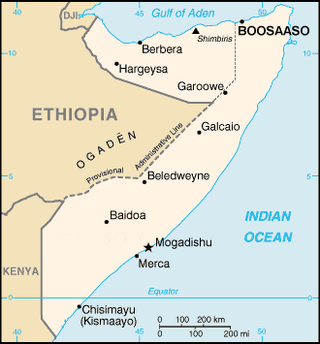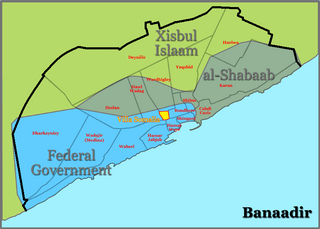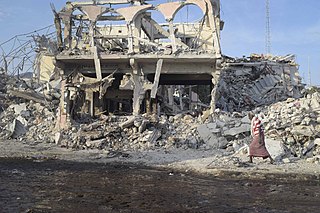
The African Union Mission in Somalia (AMISOM) was a regional peacekeeping mission operated by the African Union with the approval of the United Nations Security Council. It was mandated to support transitional governmental structures, implement a national security plan, train the Somali security forces, and to assist in creating a secure environment for the delivery of humanitarian aid. As part of its duties, AMISOM supported the Federal Government of Somalia's forces in their battle against Al-Shabaab militants.
Terrorism in Uganda primarily occurs in the north, where the Lord's Resistance Army, a militant Christian religious cult that seeks to overthrow the Ugandan government, has attacked villages and forcibly conscripted children into the organization since 1988. The al-Shabbab jihadist group has also staged attacks in the country.

The Hargeisa–Bosaso bombings occurred on October 29, 2008, when six suicide bombers attacked in coordinated car bombings targets in Hargeisa, the capital of Somaliland, and the Puntland port of Bosaso in northeastern Somalia. The bombings killed at least 30 people.

The Somali civil war (2009–present) is the ongoing phase of the Somali civil war which is concentrated in southern and central Somalia. It began in late January 2009 with the present conflict mainly between the forces of the Federal Government of Somalia assisted by African Union peacekeeping troops and al-Shabaab militants who pledged alliegence to al-Qaeda during 2012.
Two large-scale attacks against AMISOM soldiers carried out by al-Shabaab suicide bombers in Mogadishu, Somalia occurred in 2009. In total 32 people, including 28 AMISOM soldiers, were killed and 55 people were injured.

The Battle of Mogadishu (2010–11) began on 23 August 2010 when al-Shabaab insurgents began attacking government and African Union Mission to Somalia (AMISOM) positions in the Somali capital of Mogadishu. Al-Shabaab began its offensive after its spokesman said the group was declaring a "massive war" on troops sent by AMISOM, describing its 6,000 peacekeepers as "invaders". In December 2010 the number of AMISOM troops was increased to 8,000 and later to 9,000. The battle's name usually includes the years, when referenced, in order to distinguish it amongst the nine major Battles of Mogadishu during the decades long Somali Civil War.

This is a 2011 timeline of events in the Somali Civil War (2009–present).
The 2011 Mogadishu bombing occurred on 4 October 2011, when a suicide bomber drove a truck into the gate of the Transitional Federal Government's ministerial complex in Mogadishu, Somalia. The resulting explosion killed 100 people and injured over 110 others. Al-Shabaab, an Islamist group, claimed responsibility for the attack. The attack is reported to be the largest since Al-Shabaab launched an insurgency in Somalia in early 2007. It also follows the withdrawal of Al-Shabaab's forces from the area in August after an AMISOM intervention to bring aid to the country during a season of drought.

This is a 2012 timeline of events in the Somali Civil War (2009–present).

Many terrorist attacks have occurred in Kenya during the 20th and 21st centuries. In 1980, the Jewish-owned Norfolk hotel was attacked by the Palestine Liberation Organization (PLO). In 1998, the US embassy was bombed in Nairobi, as was the Israeli-owned Paradise hotel in 2002 in Mombasa. In 2013, the Somali jihadist group al-Shabaab killed 67 people at Nairobi's Westgate Shopping Mall. There have also been many other attacks.

This is a 2015 timeline of events in the Somali Civil War (2009–present).
This article contains a timeline of events for the Somali jihadist group al-Shabaab.

The Battle of El Adde took place on 15 January 2016. Al-Shabaab militants launched an attack on a Kenyan-run AMISOM army base in the town of El Adde, Gedo, Somalia. It remains the deadliest attack on the African Union Mission to Somalia and is the Kenya Defence Forces (KDF) largest defeat since independence in 1963. As such, the Kenyan government went to extreme lengths to conceal the extent of its losses. It has been described by the media as a "military massacre" or military disaster. It was also the largest military defeat in Kenyan history.

This is a 2016 timeline of events in the Somali Civil War (2009–present).

On 14 October 2017, two truck bombings took place in Mogadishu, the capital of Somalia, killing at least 587 people and injuring 316 others. Almost all of the casualties were caused by one of the trucks, which detonated when the driver, while attempting to escape from security officials, crashed through a barrier and exploded in the Hodan District, destroying a hotel. The intended target of the attack is believed to have been a secure compound housing international agencies and troops. The second blast happened close by, killing two people. A third explosives-laden truck was captured by police.

This is a 2018 timeline of events in the Somali Civil War (2009–present).
On 1 April 2018, Al-Shabaab fighters attacked an AMISOM base in Bulo Marer in the Lower Shebelle region of Somalia.
Events in the year 2021 in Somalia.
From late October to mid November 2021, the Allied Democratic Forces (ADF) and the Islamic State organization carried out four bombing attacks across Uganda.
This is a 2019 timeline of events in the Somali Civil War (2009–present).









